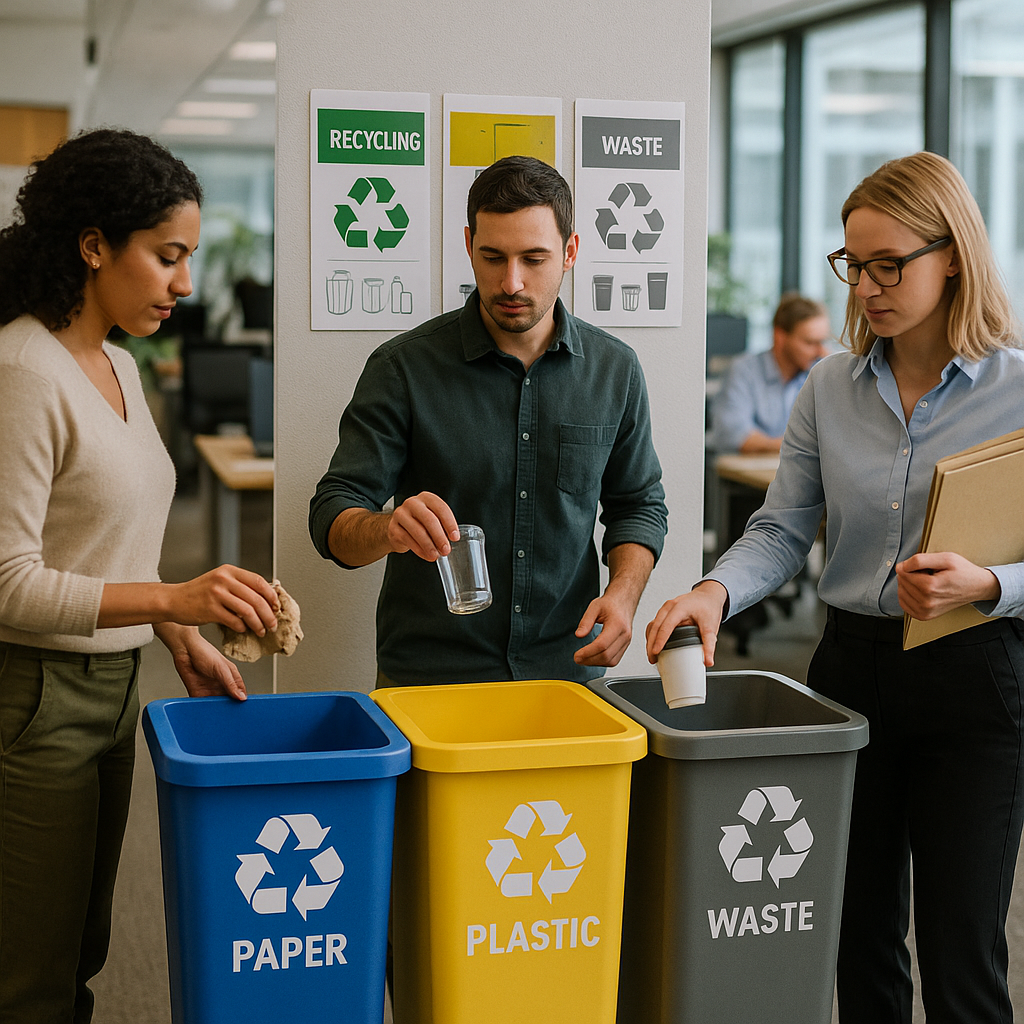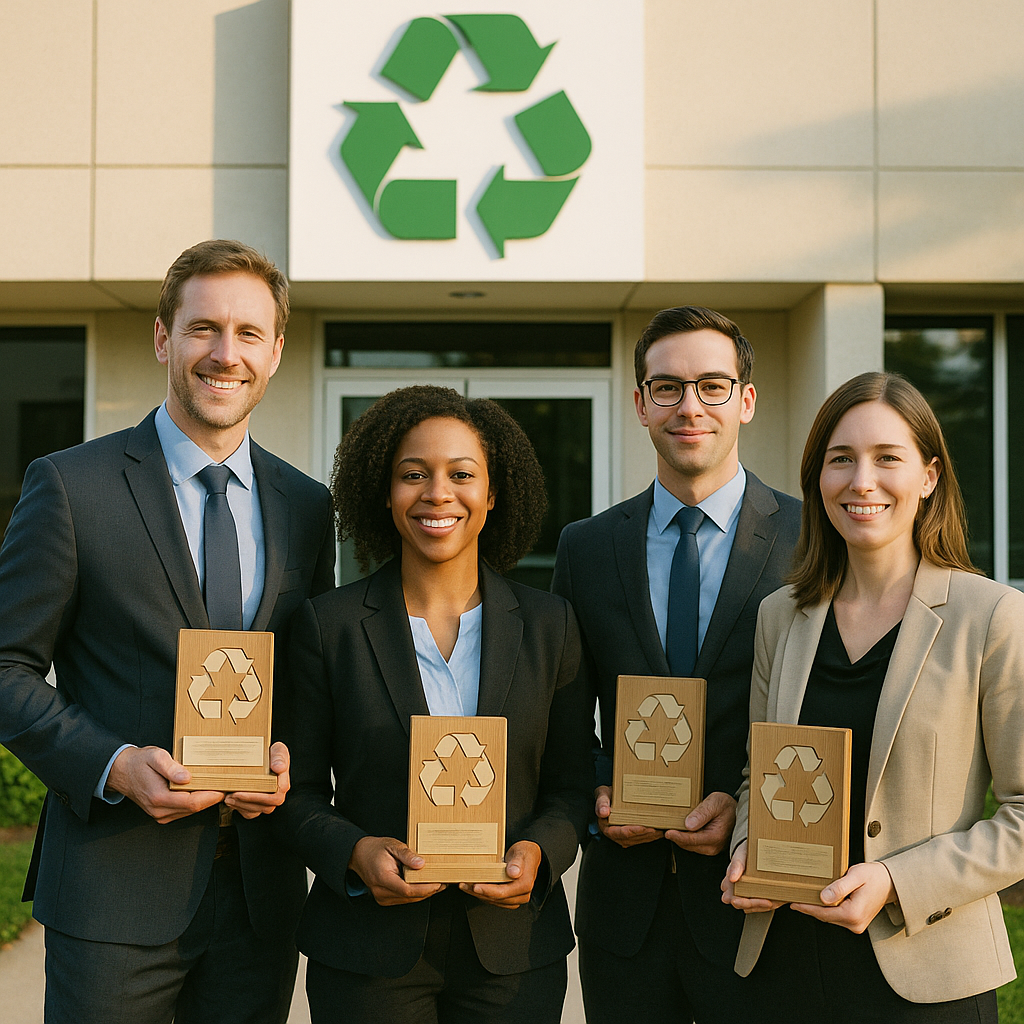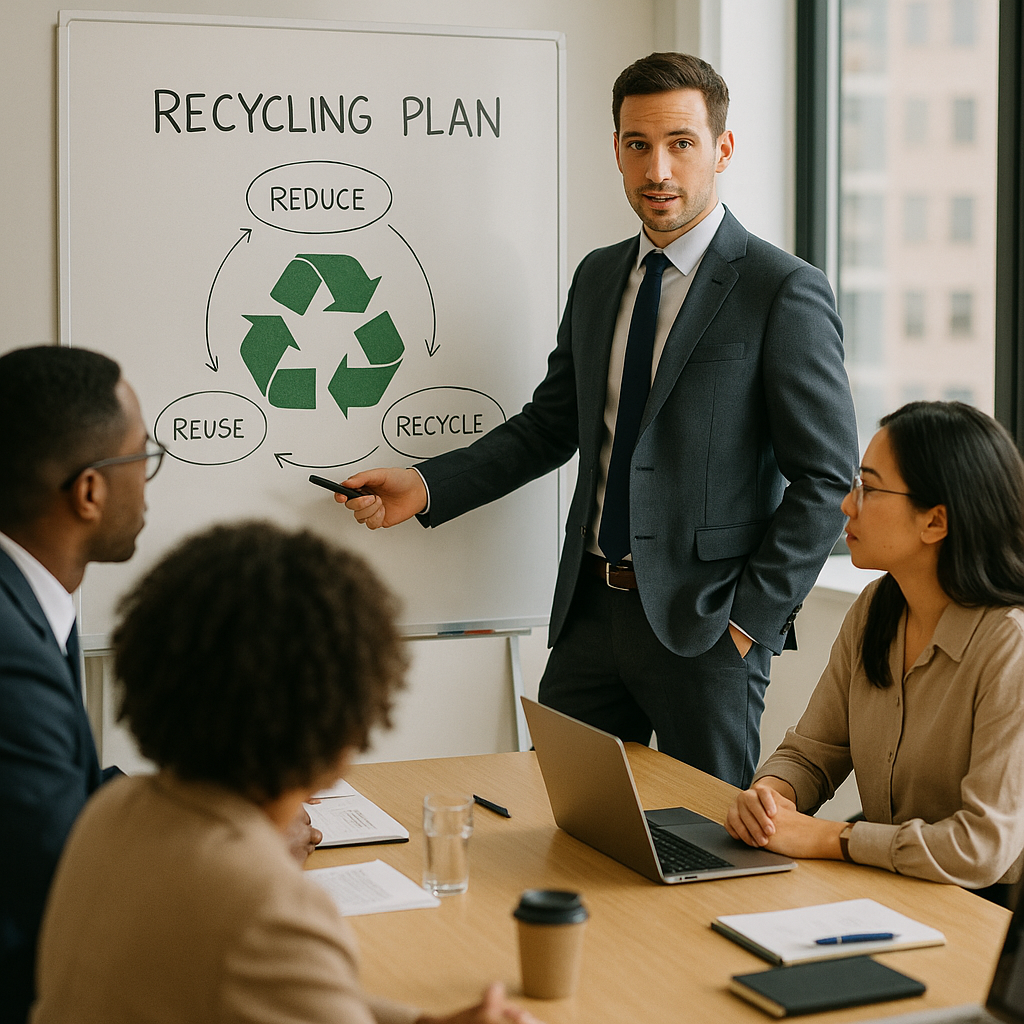5901 Botham Jean Blvd, Dallas, TX 75215
Corporate Recycling Initiatives: How Businesses Reduce Waste and Boost Sustainability
July 5, 2025Corporate recycling initiatives extend beyond simply placing a few recycling bins around the office. They involve comprehensive strategies such as establishing organization-wide recycling programs, conducting detailed waste audits to understand disposal patterns, and forming strategic partnerships with specialized recycling companies. The EPA increasingly emphasizes the role businesses play in waste reduction, as commercial entities generate significant portions of the national waste stream.
These initiatives have gained momentum as more businesses recognize both their environmental responsibility and potential business benefits. From enhancing brand reputation to achieving cost savings through reduced waste management expenses, corporate recycling delivers multiple advantages.
Companies implementing these programs often find they serve as a foundation for broader sustainability efforts, creating a ripple effect that extends throughout their operations and supply chains.
Why Are Corporate Recycling Programs Important?

Corporate recycling programs play a crucial role in environmental protection amid increasing regulatory scrutiny. Governments globally are enforcing stricter waste management laws, holding companies accountable for their environmental impact. These programs address this challenge by reducing the waste sent to landfills.
For businesses focused on financial performance, recycling initiatives offer measurable cost savings. Companies with comprehensive waste management systems often experience reduced disposal fees and potential revenue from recyclable materials. These financial benefits extend beyond immediate savings.
Reducing carbon footprints is a key benefit of corporate recycling. By diverting materials from landfills, businesses prevent the release of methane and other greenhouse gases. Recycling one ton of paper can save up to 17 trees and prevent carbon emissions associated with manufacturing new products.
Operational Efficiency and Resource Management
Well-designed recycling programs enhance operational efficiency throughout an organization. They promote systematic evaluation of material flows and waste streams, often revealing opportunities for process improvements beyond waste management.
Resource conservation emerges naturally from effective recycling. By recycling materials like paper, plastic, and metal, businesses reduce the demand for virgin resources. This approach fosters a more sustainable supply chain that can withstand resource scarcity and price volatility.
Workplace organization improves with structured recycling systems. Designated collection points and clear processes help maintain orderly facilities. Staff become more conscious of material usage and disposal patterns.
Building Corporate Reputation and Culture
Corporate recycling programs significantly enhance company reputation among eco-conscious consumers and clients. Modern customers expect businesses to demonstrate environmental responsibility. Recycling initiatives visibly show this commitment.
Employee morale and engagement grow through participation in corporate sustainability efforts. Staff take pride in working for organizations that prioritize environmental stewardship. Recycling programs offer daily opportunities for employees to support corporate environmental goals.
Business relationships benefit from demonstrated sustainability commitments. Many companies now evaluate potential partners and suppliers based on environmental practices. Strong recycling programs can provide competitive advantages in B2B contexts where sustainability metrics are important.
Regulatory compliance becomes more manageable with established recycling systems. As environmental regulations tighten globally, businesses with robust waste management programs face fewer compliance challenges. This proactive approach minimizes regulatory risks and potential penalties.
What Are Some Successful Corporate Recycling Strategies?

Major corporations are pioneering waste management with innovative strategies that significantly impact the environment. Companies with comprehensive recycling programs typically reduce waste by 30–40% within months. These programs address multiple waste streams beyond just paper or plastic.
Green teams are vital to successful corporate sustainability initiatives. These dedicated employee groups drive recycling efforts, ensure proper disposal practices, and educate colleagues on responsible waste handling. The presence of a green team often increases participation rates in recycling programs.
Waste Audits and Data-Driven Approaches
Regular waste audits offer corporations crucial insights into their waste generation patterns. By analyzing trash contents, companies can pinpoint specific opportunities for reduction. One major corporation implementing regular audits reported a 40% decrease in paper waste and a 30% decrease in plastic waste within six months.
2/”>AI-powered waste tracking is the forefront of corporate recycling strategy. This technology enables businesses to monitor and optimize recycling efforts with unprecedented precision. A mid-sized business using AI-driven waste tracking achieved a 25% improvement in waste reduction.
The data from waste audits allows companies to set measurable goals and monitor progress over time. This accountability helps maintain momentum and highlight the financial benefits of waste reduction to stakeholders.
Industry Leaders Setting the Standard
Intel has pioneered innovative e-waste management strategies to keep electronic components out of landfills. Their partnership with Reverse Logistics Group Americas created a specialized program for Intel NUC devices that promotes the circular economy. Intel focuses on not just recycling but recovering, reusing, and upcycling materials whenever possible.
Managing steel, plastic, and aluminum waste offers significant cost-saving opportunities that Intel capitalizes on through their comprehensive workplace waste management plan. Their efforts show how sustainability initiatives can align with business goals.
Other corporations achieve impressive results through similar strategies. Waste reduction through comprehensive recycling is increasingly seen as essential rather than optional. Companies applying effective recycling programs enhance their reputation and reduce operational costs.
Creating Effective Corporate Recycling Programs
Successful corporate recycling programs typically share key elements. Strategically placing clearly labeled recycling bins throughout office spaces makes disposal convenient. Employee education ensures everyone understands what can be recycled and how.
Switching to eco-friendly office supplies made from recycled materials creates a closed-loop system. Reducing paper waste through digital solutions like e-signatures, cloud storage, and electronic invoicing significantly decreases a company’s environmental footprint.
Partnering with specialized recycling services ensures the proper processing of collected materials. These partnerships often provide access to advanced recycling technologies for complex waste streams.
Food waste composting programs are another frontier in corporate sustainability. By diverting organic waste from landfills, companies reduce methane emissions while creating nutrient-rich soil.
How Can Businesses Implement Effective Recycling Initiatives?

Start With a Comprehensive Waste Audit
A waste audit serves as the basis for a successful recycling program. This systematic assessment helps businesses understand the types and quantities of waste they produce daily. Insights from a waste audit enable companies to identify specific recyclable materials and areas for waste reduction.
During a waste audit, collect waste from various departments over several days to ensure accurate representation. Sort and weigh materials by category (paper, plastic, metal, organic waste) to quantify your waste stream. This data-driven approach reveals opportunities for immediate improvement and establishes a baseline for future progress.
Once you understand your waste profile, set specific, measurable recycling goals. For example, aim to divert a certain percentage of waste from landfills within six months. Clear targets make it easier to track success and maintain momentum as your recycling initiative develops.
Develop Clear Recycling Policies and Infrastructure
Establish comprehensive recycling policies that outline expectations, procedures, and responsibilities. These policies should specify which materials can be recycled, how they should be prepared, and who oversees different aspects of the program. Clear guidelines eliminate confusion and create accountability throughout the organization.
Strategic placement of recycling infrastructure is crucial for program success. Install clearly labeled recycling bins in high-traffic areas like break rooms, near copiers, and next to workstations. Color-coding and clear signage help employees quickly identify the appropriate bin for different materials. The easier you make recycling, the higher the participation rates you’ll achieve.
Consider workspace layout when positioning bins to maximize convenience. For instance, place paper recycling near printers and document disposal areas, and install food waste collection bins in kitchens and break rooms. This thoughtful approach to infrastructure removes participation barriers.
Prioritize Employee Education and Engagement
Employee involvement directly impacts recycling program success. Conduct regular training sessions to educate staff about proper waste sorting and the environmental impact of recycling. Address common misconceptions and demonstrate correct recycling practices through hands-on workshops.
Create a dedicated green team with representatives from different departments to champion recycling efforts. These individuals can monitor bin usage, answer questions, and provide ongoing education. Their visible commitment helps normalize recycling behaviors throughout the organization.
Recognize and reward departments or individuals who show exceptional commitment to recycling. Consider friendly competitions to boost participation rates. Simple recognition programs acknowledge effort and reinforce the importance of sustainability within company culture.
Leverage AI and Technology for Enhanced Recycling
Modern technology offers powerful tools to optimize recycling initiatives. AI-driven waste tracking systems can monitor waste generation patterns, identify improvement opportunities, and measure program success. These systems provide valuable data that helps businesses refine their approach over time.
Case studies demonstrate technology’s impact. One mid-sized business implemented AI-driven waste tracking and improved waste reduction by 25%. Similarly, a major corporation reduced paper waste by 40% and plastic waste by 30% within six months after introducing waste audit procedures and green office programs.
AI technology extends beyond tracking to waste sorting operations. Smart sorting systems can identify recyclable materials more accurately than manual methods. These technologies reduce contamination in recycling streams and increase the volume of materials successfully recovered.
Partner With Waste Management Specialists
Establish relationships with local recycling service providers who understand your specific needs. These partnerships ensure proper disposal of materials and provide expertise on recycling best practices. Professional waste management companies often offer customized solutions based on your waste profile.
When selecting a partner, verify their environmental credentials and processing methods. Request information about where materials go after collection and how they’re processed. Responsible partners maintain transparency about their operations and environmental impact.
Regular communication with your waste management provider helps identify new recycling opportunities. As technology and markets evolve, additional materials may become recyclable. Stay informed about these developments to continuously expand your recycling program.
Monitor, Evaluate and Continuously Improve
Regular assessment is essential for long-term success. Track key metrics such as recycling rates, contamination levels, and waste diversion percentages. Compare these measurements against your established goals to identify both successes and areas needing improvement.
Collect feedback from employees about program challenges and suggestions. Their firsthand experience provides valuable insights that might not be captured in quantitative data. Address concerns promptly to maintain participation and demonstrate commitment to program improvement.
Recycling markets and technologies evolve rapidly. Stay informed about industry developments and best practices. Attend sustainability conferences, join business environmental networks, and research innovations in waste management. This ongoing education helps your program remain effective and current.
Conclusion: The Future of Corporate Recycling

Corporate recycling initiatives are continually developing as businesses acknowledge their crucial role in ensuring a sustainable future. The corporate sector is transitioning from traditional linear economic models to circular economy principles. This shift emphasizes maximizing resource value throughout product lifecycles and minimizing waste. By designing products for reuse and enhancing recycling systems, companies are discovering both environmental benefits and competitive advantages.
Technological advancements are transforming corporate waste management practices. AI-powered sorting systems now identify and separate recyclable materials with remarkable precision. Automation streamlines collection processes, while advanced tracking systems monitor waste streams with unprecedented accuracy. These technologies not only enhance recycling efficiency but also provide valuable data for optimizing sustainability efforts. For businesses committed to environmental stewardship, adopting these innovations isn’t just good practice—it’s becoming essential for long-term success. Contact Okon Recycling at 214-717-4083 for all your corporate recycling needs.
